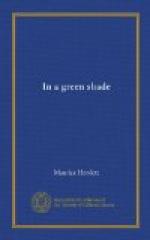To return, however, to dialect, intonation, as I say, has much to do with it. It is attractive, and in poetry can be very touching. I have had the advantage of hearing Barnes’s poems read by a lady who has the accent perfectly. One does not know Barnes or Wessex who does not hear him read. That is true of all poetry, no doubt—but Barnes is uncommonly dull to read. As for words, we have enough of our own to support a small lexicon, which I used to possess, but have just been hunting, in vain. Perhaps after the pattern of the arrow, I shall find it again in the shelf of a friend. I remember that we call the roots of a tree the mores; that a dipper is a spudgell; that we say “dout the candle” when we mean extinguish it. We say “to-year” as you say “to-morrow,” and call the month of March “Lide.” February used to be “Soul-grove,” but I have never heard it called so. The pole of a scythe is the snead; the two handles are the nibs. They are fastened by rings called quinnets. Isaac Taylor says that the few remaining Celtic words we have in use (other than hill or river names) are words for obscure parts of tools. We have some queer intensives—“terriblish” or “tarblish” is one, and “ghastly,” meaning ugly, is another. “A terrible ghastly sight” we say, meaning that a thing looks rather ugly.
Our demonstrative pronoun is thic, or more properly dhic; “dhic meaed” means “that meadow.” Suent means pleasant or proper—really both. It always has a sense of right consequence, of one thing following another as it ought. “Suently” would be “duly.” But that now is common to the West, and will be heard from Land’s End to Hengistbury Head, as well as in every one of Mr. Phillpotts’ novels.
Doubtless it is too late to protest—since I am upon words—against a current barbarism which is at least ten years old, and against which I have publicly cried out at least twenty times. For the twenty-first time, then, let me object to “wage” for “wages.” Is the wages of sin death, or are they? Do you give a man an alms, or an alm?
Shall we read—
Fear no more the heat o’ the sun,
Nor the furious winter’s rage,
and so on? Go to. But I shall not so easily convert Trade Union orators, Members of Parliament, Mr. Sidney Webb, or the Times. To them a wages is a wage, and an alms an alm, a man’s riches his rich, and his breeches his—at least I suppose so. I wish that we could call a man’s speeches his speech, and find it was perfectly true. It is a terrible thought, “a terrible ghastly thought” indeed, that we have not so long ago chosen over seven hundred persons of both sexes, each of whom will conceive it his right to make a speech in Parliament every day. Think of it. It is fair to suppose that every one of them will make one speech every year, many of them, no doubt, one every week, some certainly every day. I am thankful that I wasn’t a candidate, for I might have been successful. Then I should have been compelled to listen, and perhaps tempted to reply, to some or all of those speeches. “In the end thereof despondency and madness.”




